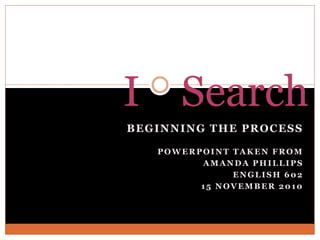Report
Share

Recommended
LANGUAGE FUNCTION: EXPRESSING AND FINDING OUT ABOUT OPINIONS AND ATTITUDESLANGUAGE FUNCTION: EXPRESSING AND FINDING OUT ABOUT OPINIONS AND ATTITUDES

LANGUAGE FUNCTION: EXPRESSING AND FINDING OUT ABOUT OPINIONS AND ATTITUDESA. Tenry Lawangen Aspat Colle
More Related Content
What's hot
LANGUAGE FUNCTION: EXPRESSING AND FINDING OUT ABOUT OPINIONS AND ATTITUDESLANGUAGE FUNCTION: EXPRESSING AND FINDING OUT ABOUT OPINIONS AND ATTITUDES

LANGUAGE FUNCTION: EXPRESSING AND FINDING OUT ABOUT OPINIONS AND ATTITUDESA. Tenry Lawangen Aspat Colle
What's hot (6)
LANGUAGE FUNCTION: EXPRESSING AND FINDING OUT ABOUT OPINIONS AND ATTITUDES

LANGUAGE FUNCTION: EXPRESSING AND FINDING OUT ABOUT OPINIONS AND ATTITUDES
Viewers also liked
Viewers also liked (7)
Similar to I search powerpoint
Similar to I search powerpoint (20)
Guide TO FINDING YOUR NATURAL TALENTS AND STRENGTHS

Guide TO FINDING YOUR NATURAL TALENTS AND STRENGTHS
Chapter 6 Ask Questions That Lead to Good Thinking From what we ha.docx

Chapter 6 Ask Questions That Lead to Good Thinking From what we ha.docx
When you told us about this twenty five research paper” on the fi.docx

When you told us about this twenty five research paper” on the fi.docx
More from Laura Smith
More from Laura Smith (12)
I search powerpoint
- 1. BEGINNING THE PROCESS POWERPOINT TAKEN FROM AMANDA PHILLIPS ENGLISH 602 15 NOVEMBER 2010 I Search
- 2. I-Search? Y-Search? Because. The “I” in I-Search represents you. You are the researcher, and the resulting paper will be the story of your discoveries. Get pumped.
- 3. Your paper will consist of three parts. • What did you already know? • What did you want to learn? • What did you do? Story of the search • Your results. • Questions you answered. • Questions you didn’t answer. What you learned • What did you gain from this search? • Did this change your thoughts about research? Your reflections
- 4. U-pick the topic. Choose a topic that’s relevant to your life. Ask yourself: What genuinely interests me? What would I like to know more about?
- 5. Seriously. Think about it. Prioritize: What factors have the greatest impact on your life? Family? Politics? Science? Medicine? Economy? Food? Media? Travel? Religion? School? Art? Technology? List possibilities in your journal!
- 6. Keep thinking. If it helps, use “trigger phrases” “I’ve always wanted to know more about _____” “I wonder how _____ relates to _____” “In order to _____, I should understand _____” Keep writing.
- 7. Pause for consideration. Are any of these topics going to lend themselves to research? Ask yourself: Am I really interested? (If the answer is “no,” stop right there!) Will I be able to find outside sources on this topic? (If not, there won’t be much of a “search”)
- 8. Form a research question. This is a question that can’t be answered by a simple “yes” or “no” It should be specific and tightly focused In fact, this question will more than likely lead to more complex questions
- 9. Can U-Answer the following? What is my topic? “Autobiography. Specifically, women’s autobiography.” Why am I interested in this topic? “Because I like to read them. And because I am interested in the intersections between life stories, the idea of ‘Self,’ and the act of writing.”
- 10. And so on… What do I hope to learn from my research? “I want to explore the ways in which women create identity through autobiographical depictions of self and life experience. I want to look at the ways in which women’s autobiography differs (if it DOES differ…) from men’s.” Possible Research Question: How does women’s autobiographical writing differ from, subvert, or uphold the standards of traditional (men’s) autobiography?
- 11. Keep in mind. Finding a good question is only the beginning, but it’s an important step. As you embark on your search, you may find that your question shifts and evolves. This is okay. Track your progress. Write everything down!
- 12. That is all. For now. Go home and continue to generate ideas. For next class: 1.) Come to class with a possible question that meets the criteria covered today. 2.) We will split into small groups to discuss/share ideas. 3.) Then we will talk logistics.
- 13. Work Cited Adapted from “Writing an I-Search Paper” http://faculty.nwacc.edu. Accessed 11 November 2010.
